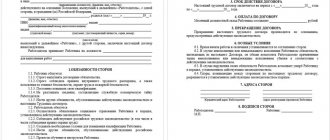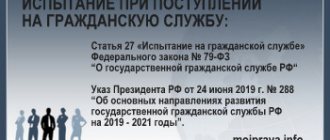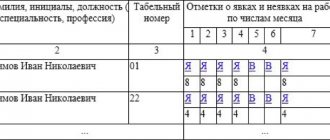Is testing possible with a fixed-term contract?
The procedure for applying the probationary period (test) is prescribed in Art.
70 and 71 of the Labor Code of the Russian Federation. According to Part 1 of Art. 70 of the Labor Code of the Russian Federation, when concluding both a fixed-term and a regular employment agreement, the organization’s administration has the right to indicate in it a clause on the obligation for the employee to undergo a test and its duration, but only with the consent of the employee.
If this issue is not specifically discussed in the contract, the employee is accepted without testing.
The list of situations when the administration of an organization does not have the right to assign a test to employees is indicated in Part 4 of Art. 70 Labor Code of the Russian Federation. The only restriction that applies specifically to a fixed-term contract is the prohibition on a trial period if the contract lasts less than two months. If the contract is concluded for a longer period, the administration has the right to apply a probationary period to the employee.
Dismissal
How to fire during a probationary period with urgent work?
This can happen at the will of both the employer and the subject himself.
The employer, if he did not like the candidate. has the legal right to get rid of it (Article 71 of the Labor Code) and no urgency of the contract will be an obstacle to this.
The director must officially notify the employee in writing at least three days before the intended dismissal that the employer-employee relationship is being terminated earlier than the established deadline.
Main reasons
There are three of them: the candidate systematically failed to cope with the responsibilities assigned to him. fails to cope with the established volumes or fails to complete the work assigned to him efficiently and on time. Of course, this must be officially indicated in the text of the notification, whatever the reason.
The document is drawn up in two copies - one copy remains in the hands of the employer - and is registered in the secretariat of the company. Having received the document, the employee puts his signature on it - or does not sign, about which a corresponding act is drawn up.
On the same day, the manager issues a dismissal order; The outgoing candidate is counted and given a work book. In this case, there is no need to consult with the elected body; the employee is also not entitled to benefits.
If this dismissal procedure has been violated. a dismissed person can easily appeal the management’s decision in court (he is even exempt from state duty).
This is also possible when the text of the notice contains only general text and it is not at all clear why the employer did not like the applicant.
If the initiative to leave ahead of schedule comes from the candidate, he, in turn, notifies his boss in writing no less than three days in advance.
In a word, as elsewhere, in this situation the worst enemy (this applies to both sides) is ignorance.
Therefore, the applicant needs to clearly understand what he is getting into and what may follow a seemingly tempting offer.
In turn, the employer is obliged to strictly comply with the rules for assigning a probationary period.
Didn't find the answer to your question? Find out how to solve exactly your problem - call right now:
+7 (Moscow)+7 (812) 309-82-63 (St. Petersburg)
It's fast and free!
Test period
According to Part 5 of Art. 70 of the Labor Code of the Russian Federation, a trial period of up to three months can be established for an ordinary employee. If an employee is hired for a responsible position (manager, chief accountant, their deputies, head of a separate division), then the probationary period for such an employee can last up to six months.
If the contract period is less than six months, then regardless of what position the employee is hired for, the probationary period cannot be longer than two weeks.
Do not forget that the probationary period does not count the time spent on sick leave, vacation at one’s own expense, as well as other periods when the employee did not actually work.
Conditions for passing
The employer has the right to check the qualities of an employee only after registration of the TD and permission to perform duties. This means that the new employee is subject to all local regulations, is obliged to follow the job description, comply with the work schedule and regime.
If an employee was absent during the test under a fixed-term employment contract due to illness or other valid reason, then the missed days are not counted and the test is extended.
Read more: Is sick leave possible during a probationary period?
When not prescribed
Art. 70 of the Labor Code of the Russian Federation establishes a closed list of cases when the use of the test is unacceptable. In addition to the case of concluding a contract for a period of less than two months, probation is not assigned to the following employees:
- selected by competition;
- pregnant women and during the period of the right to maternity leave, that is, until the child reaches one and a half years;
- young specialists during the first year after graduation, if they are employed for the first time;
- elected to elective positions;
- in case of transfer from another organization.
Decor
How to arrange a probationary period for a fixed-term employment contract?
It all starts with the announcement of the “wanted” category.
That is:
- The company advertises for employment indicating the expected “test” period .
- An appropriate contract is concluded with the candidate you like, and its text must stipulate a trial period , as well as its conditions and for how long it is set (for example, for three weeks).
- The manager issues an order of appointment.
All these components are mandatory . Even if this period was assumed, but there is not a word about it in the text of the employment contract, this will mean that the candidate was hired for the position without testing.
And if the agreement itself has not been drawn up, then in this case it is too late to talk about a “test period” and about introducing it retroactively into the text of the main document - unless the parties signed an agreement on this the day before.
If the appointed end date of the probationary period has already passed, and the candidate continues to work in the company, this means that he has been hired for good .
How to register correctly
ConsultantPlus has many ready-made solutions, including how to hire under a fixed-term employment contract. If you don't have access to the system yet, you can sign up for a free trial online! You can also get the current K+ price list.
To formalize the test, the corresponding clause stating that the employee is assigned a test of one duration or another must be included in the contract.
In practice, a situation may arise when an employee is hired without drawing up an employment contract. Employers perceive such work as a test. However, this option of establishing a test is illegal, based on the provisions of paragraph 2 of Art. 70 Labor Code of the Russian Federation. Even if an employment agreement has not been concluded with the employee, but he is actually hired, a separate agreement must be drawn up with him, indicating that a probationary period will be applied to him.
As for the wording, the test condition can be written down in a contract or a separate agreement as follows:
"2.4. An employee is hired for a position…. with a probationary period of ... months.”
Subscribe to our newsletter
Yandex.Zen VKontakte Telegram
Extension of a fixed-term employment contract
In what cases can a fixed-term employment contract be extended? Let's consider several situations.
Mandatory contract extension
The validity of a fixed-term employment contract can be necessarily extended only in one case - if it coincides with the period of pregnancy of the employee. In this situation, the employer is obliged to extend the term of the employment contract until the end of the pregnancy. This is stated in Part 2 of Article 261 of the Labor Code.
The employee must submit a written application and bring a medical certificate confirming the state of pregnancy2.
Prolongation by agreement of the parties
Part 4 of Article 58 of the Labor Code says the following. In the event that neither party requested termination of the fixed-term employment contract due to its expiration and the employee continues to work, the condition on the fixed-term nature of the employment contract loses force. After this, the employment contract is considered concluded for an indefinite period. Is it necessary to document the fact of changing the status of a fixed-term contract to an open-ended one?
In fact, the change in contract status occurs automatically. After this, the fixed-term employee is subject to labor law norms that are provided for employees who have entered into permanent employment contracts. For example, such an employee can no longer be dismissed on the basis of the expiration of the employment contract (Clause 2 of Article 77 of the Labor Code of the Russian Federation).
However, in this case, it is advisable to prepare a number of documents. Such recommendations are given in the letter of Rostrud dated November 20, 2006 No. 1904-6-1.
First of all, this is an additional agreement to the employment contract. It can be worded as follows: “State clause No. ... in the following wording: “This employment contract is concluded for an indefinite period.”
Next, an order is drawn up from the manager, which should also indicate that the employment contract with the employee should be considered unlimited. The basis for the order will be the above additional agreement.
Fixed-term contract with a pensioner
Employers often enter into fixed-term contracts with pensioners. At the same time, many believe that this is the only form of relationship with this category of employees. However, it is not. The Constitutional Court's Ruling No. 378-O-P dated May 15, 2007 states that when concluding an employment contract with a pensioner, the term can only be set by agreement of the parties. A similar conclusion is contained in paragraph 13 of Resolution No. 2.
Consequently, employment contracts can be concluded with retired employees for an indefinite period. There is also no need to dismiss an employee who has received pensioner status and enter into a fixed-term contract with him. He can continue to work on the basis of a previously concluded open-ended contract.
Can the probationary period be extended?
In Art. 70 of the Labor Code of the Russian Federation indicates the test deadlines. Accordingly, setting longer deadlines than specified in the code is unacceptable. However, the same Art. 70 of the Labor Code of the Russian Federation does not prohibit the extension of the test to the maximum possible period (three or six months, depending on the category of the employee). For example, if an employee is hired on a probationary period of one month, and the employer still has doubts about his professional skills, then before the expiration of the probationary period it can be extended, provided that the total probationary period does not exceed three (six) months.
Also, the probationary period is automatically extended if the employee did not actually work during the period of its validity. Accordingly, the extension period will be equal to the number of days when the employee was not at work (he was on unpaid leave, sick leave, etc.).
Who can enter into an agreement and when?
Fixed-term contract for certain categories of workers.
A fixed-term employment contract is usually concluded for a clearly defined period of time. Depending on the circumstances, it can be concluded both for a period of time (a week, a month, six months) and for the duration of the execution of certain tasks or work (handing over an object, completing reports, etc.).
One of the main requirements when concluding such an agreement is the need to accurately indicate the reason for its execution and the terms for which it is concluded.
Based on the basis of the conclusion, one can distinguish unconditional reasons, as well as those in which it is concluded by agreement of the parties.
Unconditional reasons include the following categories of work:
- Seasonal work;
- Labor outside the territory of the Russian Federation;
- Work beyond the scope of the main work activity;
- Civil service;
- The need for temporary staff expansion;
- Completion of training by the main employee and so on.
What happens after
Once the employer is satisfied that the employee has or does not have the necessary skills (usually there is no need to wait three or six months for this), he has two possible options:
- hire an employee on a general basis;
- dismiss the employee as having failed the test.
If the probationary period is successfully completed
If the employee successfully passes the test, then there is no need to document this fact in any way. Part 3 art. 71 of the Labor Code of the Russian Federation indicates that if the probation period has expired (it can also be shortened by agreement with the employee during the trial), then the employee is considered to have passed the test and becomes a full-fledged employee, who can be dismissed only on a general basis.
If you haven't passed the probationary period
If an employee has shown himself to be negative and cannot be hired, then his dismissal is carried out before the end of the test in a simplified manner, in accordance with the provisions of Article 71 of the Labor Code of the Russian Federation. Respectively:
- the employee must be warned in writing about the upcoming dismissal at least 3 days before the dismissal;
- the dismissal must be motivated, that is, the dismissal order must indicate the reasons why the employee is not suitable for a particular organization;
- the opinion of the trade union, if there is one in the organization, is not taken into account during dismissal during the test, and severance pay is not paid to the employee.
Also, during the test, the employee himself can resign in a simplified manner. To do this, he needs to write a letter of resignation of his own free will. Moreover, the period of service in this case will not be 14 days, as in the case of dismissal in the general manner, but only 3 days, in accordance with the requirements of Part 4 of Art. 71 Labor Code of the Russian Federation.
Dismissal procedure
The dismissal of an employee is carried out in accordance with the general procedure, which is indicated in Art. 84.1 Labor Code of the Russian Federation. That is, an order is issued, an entry is made in the work book, and on the last day of work the employee is paid and given a work book. However, the following questions inevitably arise:
- How to properly motivate dismissal?
To do this, the employee’s immediate supervisor draws up a written conclusion, in which he characterizes skills, discipline and other important points for a particular position. The dismissal order is prepared on the basis of this conclusion. In this case, the order can briefly outline only the main reasons for dismissal, making reference to the corresponding conclusion. It must be remembered that the motivation for dismissal must be justified, since the employee has the right to go to court to have the dismissal declared illegal in accordance with Part 1 of Art. 71 Labor Code of the Russian Federation.
- How to correctly formulate the reason for dismissal? Part 5 art. 84.1 of the Labor Code of the Russian Federation requires that the work book contain an exact (verbatim) formulation of the reason for dismissal, coinciding with the corresponding paragraph or part of the article of the Labor Code of the Russian Federation. However, in Art. 70 and 71 of the Labor Code of the Russian Federation there are no exact formulations for this situation. In connection with this, in practice the following phrase is used: “dismissed due to unsatisfactory test results, part 1 of Art. 71 Labor Code of the Russian Federation."
- Is it possible to fire an employee with a different wording?
There are often cases when an employee does not want to be fired with such wording. In this situation, the administration of the organization can meet him halfway and dismiss him at his own request, according to his statement.
general information
Legally, the employee loses little - he signs an employment contract with a probationary period and remains employed throughout the entire inspection period. After the expiration of the period specified in the employment contract, the parties decide to separate, or the employee remains on staff, and from that moment on, the same provisions of labor legislation apply to him as to the rest of the permanent staff.
The main advantage that a trial designation provides is a simplified termination period if one or both parties decide that the collaboration is not productive.
- If the initiative comes from the employer, an additional notice of separation will be required 3 days in advance.
- If an employee decides that a new job is not suitable for him, it is enough to write an application within the same 3-day period.
Thus, if an employee is disliked by management and his work results are considered unsatisfactory, management has the right to quickly fire the person, justifying the separation on the basis of unsuccessful test results.
Labor legislation defines in detail the rules for conducting testing (Articles 70-71 of the Labor Code of the Russian Federation). Also, the Supreme Court Resolution No. 1, paragraph 9, issued on January 28, 2014, provides clarifications on the application of the provisions.
A fixed-term contract has its limitations regarding applicability and the purpose of the test. In some cases, inspections cannot be scheduled for short-term contracts. Based on Article 58-59 of the Labor Code of the Russian Federation, signing a fixed-term employment contract is permissible if:
- the main employee is absent for good reasons, while his place of work is retained (as often happens during maternity leave);
- the company requires temporary work to be performed for a short period of time;
- the company is expanding its activities and there is a need for temporary (seasonal) recruitment of labor resources;
- the employer gives specific instructions;
- An internship or practice is arranged during the training process.
Sometimes concluding a fixed-term contract is mandatory; in other situations, the parties independently determine its admissibility, simultaneously deciding on the purpose of the test and its duration.
When a fixed-term contract is signed, the duration of the trial cannot exceed the probationary period established by law.
Download a Sample of a fixed-term employment contract with a probationary period (19.2 KiB, 387 hits)
Employment contract with a probationary period. Blank (60.0 KiB, 325 hits)
Why are tests needed at all?
Probation
Such tests are needed so that employers can assess the abilities of future subordinates. And they were able to understand how competent a person is in his field.
During the probationary period, the employee must show how much his practical skills and knowledge correspond to the position he holds. And will he be able to properly perform the duties assigned to him?
For the workers themselves, this situation is a good opportunity to assess what conditions are prevailing at the enterprise. You can take a closer look at your direct responsibilities. Applicants themselves may then decide that, for example, this particular workplace does not meet their expectations.
How to calculate
The professional review period should be calculated taking into account the agreement that was drawn up with the candidate and the position that he plans to occupy. If an agreement was drawn up for a period of 2 to 6 months, then the duration cannot exceed 14 days. When hiring managers, chief accountants and their deputies, the employer can calculate for them the maximum period for testing their professional skills, which will be up to 6 months.
If an employee leaves during the test on sick leave, the days that he did not attend work will not be counted.
How is it paid?
According to the Labor Code of the Russian Federation, during the test, the employee is subject to the provisions of legislation, as well as regulatory legal acts regarding labor law.
Any enterprise has a staffing table that reflects salaries for any of the positions existing in the organization. During the test, wages cannot be lower than the salary indicated in the staffing table.
Situations involving underpayment of wages are considered unlawful. Managers often transfer subjects to another position on the staffing table with a lower salary so that unnecessary questions do not arise. Low wages can only be challenged if they are white.
About other features
Sometimes employees themselves refuse to accept an application based on the results of the probationary period. Then the management can draw up a special act. Other company employees must be present. With their signatures they confirm that they tried to serve the document. But the employee refused this. A copy of the notice is sent to the employee, with a receipt stamp.
The main thing is to comply with the deadlines established by Article 71 of the Labor Code of the Russian Federation. Such notification must be sent to the appropriate address no later than 3 days before the test expires. The exact time of dispatch is determined by the date on the stamp of the postal item.
Managers must clearly record moments when an employee failed to cope with his responsibilities. And each of these circumstances requires documentation. Where possible, the reasons are given in detail. Employers have the right to demand from employees a written explanation of why they failed to cope with their assigned duties.
Top
Write your question in the form below
How long does it last according to the Labor Code of the Russian Federation?
The head of the enterprise may initiate early termination of the inspection period if the employee has proven his professional suitability. In this case, the subject will be hired for a permanent job ahead of schedule. Below you can find the minimum, maximum and optimal duration of the test period.
Minimum
The minimum permissible probationary period at work according to the Labor Code lasts 14 days. A minimum professionalism test, during which the employer checks the professional suitability of an employee, is assigned to persons with whom a fixed-term employment contract of 2 to 6 months has been signed.
Maximum
The maximum duration of IP should not exceed 3 months. However, there is a category of professions that may be subject to a six-month review period. The maximum probationary period according to the Labor Code of the Russian Federation is assigned to candidates for the position of chief accountant and his deputy, as well as the head of the enterprise and his deputy
The specific nature of the work of the listed categories of employees does not allow checking their professional qualities in a short period of time.
Optimal period
The most preferred period for passing the test is 3 months . During this period of time, the candidate will be able to demonstrate his abilities. The manager, in turn, will be able to assess the professionalism of the new specialist and answer the question of how easily he can fit into the team.
Is it possible to extend
If a candidate for a position was on sick leave during the professional test According to the Labor Code, the employer has the right to add the amount of time that the employee did not appear at the enterprise.
Important! To extend the probation period, you will need to create a special order that will reflect the reasons for adding time.
Concept
A probationary period is a period set by the employer in order to test his professional suitability.
The main purpose of the probationary period is the possibility of dismissing an employee in a simplified manner if he does not meet the employer’s requirements.
Current legislation indicates that the probationary period is assigned taking into account the following rules:
- The presence of mutual agreement of the parties on the inclusion of a probationary period in the employment contract.
- The probationary period condition can only be used in relation to new employees hired (not those who came to the company as a result of a transfer).
- The probation period must be specified in the employment contract , which is signed by both parties. If this document does not contain a condition on the existence of a trial, then the employee is considered hired without a probationary period.
According to Art. 67 of the Labor Code, if an employee begins his work duties without a written contract, then an agreement on the conditions of the probationary period is signed with him even before the start of activity. It is unacceptable to include this clause in an employment contract after the fact.
It is also worth considering that an employee on a probationary period has the same rights as all other employees and cannot be discriminated against. In particular, on the basis of Art. 22 of the Labor Code, an employee has the right to equal pay for performing a similar job function. This means that during the probationary period the employee is not allowed to reduce his earnings.
In addition, the test condition is prescribed in the work order under Art. 68 Labor Code. At the same time, the employment note in the employee’s work book does not contain any additional information about his employment for a probationary period. This corresponds to the Instructions for filling out work books dated 2003 No. 69.








